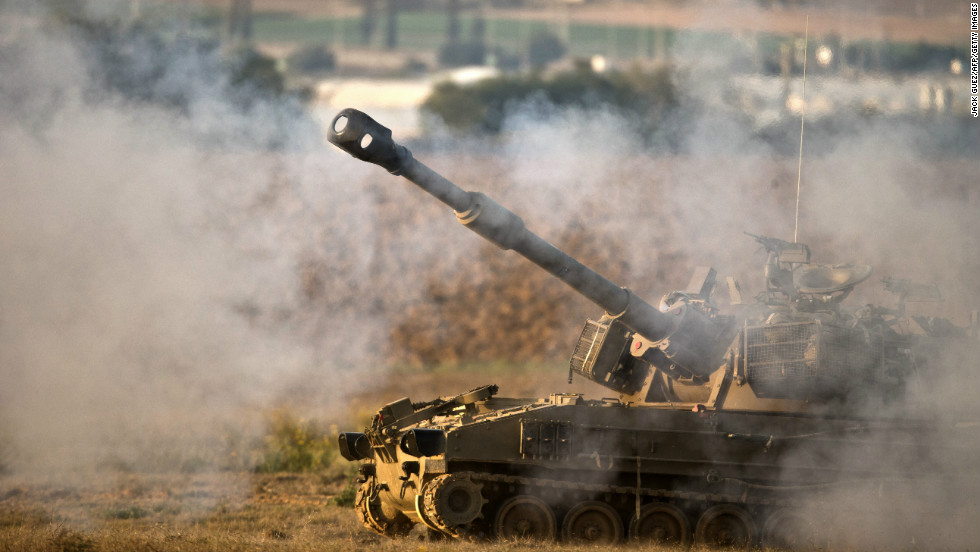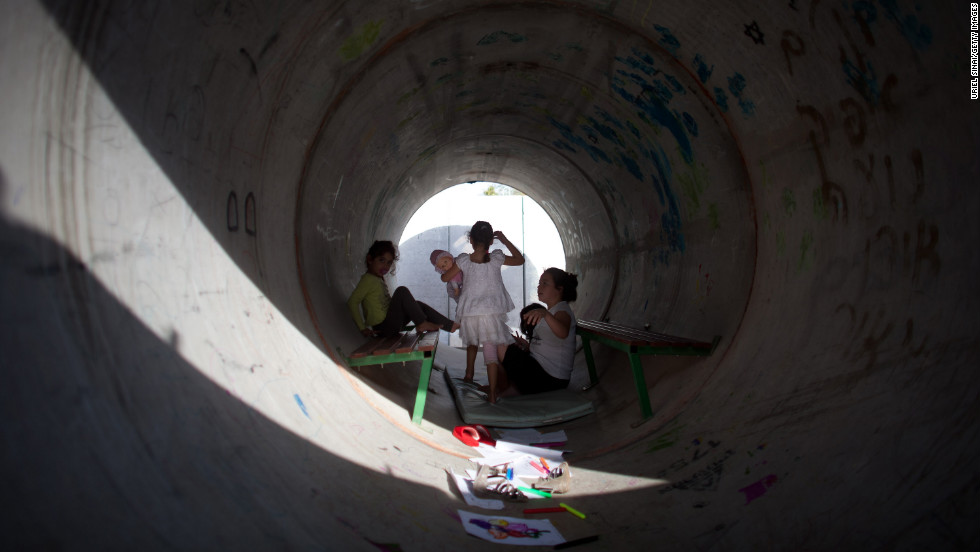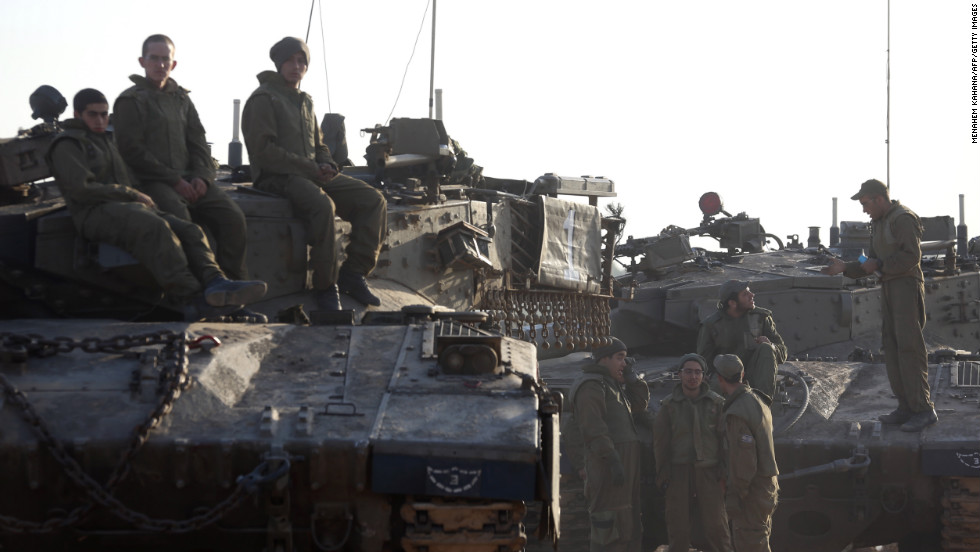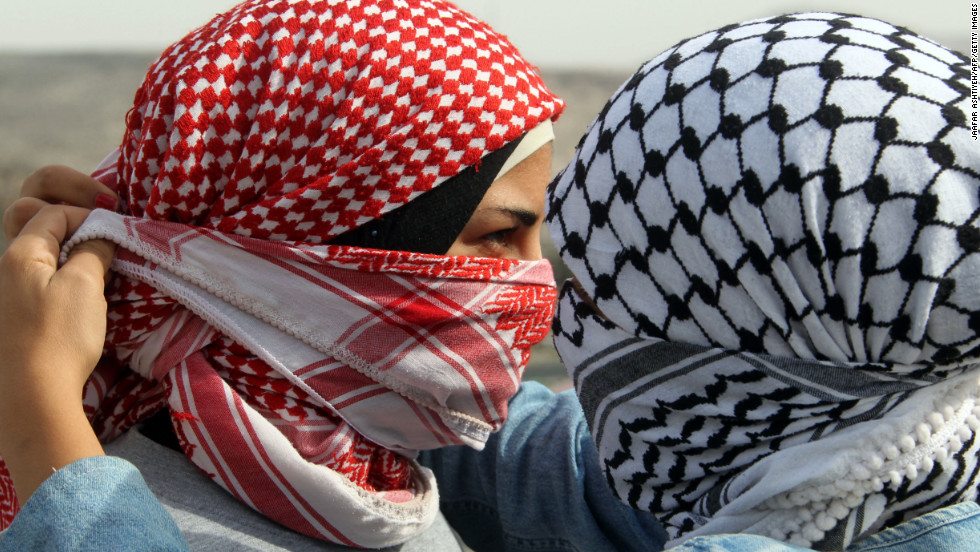Story highlights
- The goal of Hamas is an Islamic fundamentalist Palestinian state
- Call by Hamas for destruction of Israel limits its international role
- Hamas considered a terrorist group by the U.S., Israel and others; Also runs schools, hospitals and provides social welfare services
- Hamas wants to see an end to attacks on Gaza and see the territory opened to the world
Four years after the last major conflict in the region, Israel and Hamas have once again been on the brink of war in Gaza, though an Egypt-brokered cease-fire appears to be holding, paving the way for peace talks in future. So what is the group, and what does it hope to achieve by its rocket attacks on Israeli targets?
What is Hamas?
Hamas is a militant fundamentalist Islamic organization operating in the West Bank and Gaza. The name Hamas is an acronym for "Harakat Al-Muqawama Al-Islamia," or Islamic Resistance Movement in English. The word "hamas" means zeal, or enthusiasm, in Arabic.
Hamas has sections dedicated to religious, military, political and security activities. It runs a social welfare program, and operates a number of schools, hospitals and religious institutions.
What are its aims?
The goal of Hamas is an Islamic fundamentalist Palestinian state. Its manifesto advocates the destruction of the state of Israel, and calls for the raising of "the banner of Allah over every inch of Palestine."
Hamas members, like most Palestinian factions and political parties, insist that Israel is an occupying power, and that the group is simply trying to liberate the Palestinian territories.
"The Palestinian people were living in peace and security, then the Israelis occupied the land," Khaled Meshaal, the political leader of Hamas, told CNN. "According to international law, and according to the Divine laws, the Americans and all peoples, when they are occupied, they resist with all that they have."
When an Israeli airstrike killed the group's military leader, Ahmed Ja'abari, this month, Hamas warned Israel that it had "opened the gates of hell on itself."
Meshaal has previously said the group would support a Palestinian state based on the borders that existed prior to the 1967 Six-Day War, during which Israeli troops occupied Gaza, the West Bank, the Golan Heights and East Jerusalem, with East Jerusalem as its capital. However, he has stopped short of backing a full two-state solution, including acceptance of Israel's right to exist.
The refusal of Hamas to recognize the state of Israel is one reason why it has rejected peace talks in the past. In 1993, it opposed the Oslo Accords, a peace pact between Israel and the Palestine Liberation Organization (PLO).
Speaking following the most recent outbreak of violence, Mark Regev, spokesman for Israeli Prime Minister Benjamin Netanyahu, said: "Hamas is an enemy of peace. [It] is dedicated to destroying the state of Israel."
But Robert Blecher, Israel and Palestine Program Director at the International Crisis Group, said claims that Hamas wanted to see Israel "wiped off the map" were outdated.
"The document still exists as their official charter, but many people in Hamas view it is a historical document, an artifact, rather than as an active program" since Hamas has agreed to other commitments that go against it in more recent years.
Even so, it is unlikely to be altered any time soon. "It can't be changed under the current political conditions, because if they gave in to the demands of others to change it, it would look like they were making a concession," Blecher told CNN.
What are Hamas' origins?
Hamas was established in 1987 -- during the First Intifada, or uprising -- by Sheikh Ahmed Yassin.
Yassin and other activists linked to Egypt's Muslim Brotherhood movement had set up a network of charities, schools and clinics in the West Bank and Gaza in the 1960s, '70s and '80s. Initially, their activities were encouraged by some Israeli politicians, who saw the group as an alternative to the PLO and a way of lessening the influence of its leader, Yasser Arafat.
However, the founding charter of Hamas, published in 1988, called for jihad, or holy war, against Israel.
The following year, Yassin -- a partially blind quadriplegic -- was convicted by an Israeli court of ordering Hamas members to kidnap and kill two Israeli soldiers. He was released from jail in 1997 as part of a prisoner exchange, traded for two Israeli agents captured in Jordan during an attempt to assassinate Khaled Meshaal. Yassin was killed in an Israeli airstrike in 2004, after surviving an earlier attempt on his life the previous year.
The group began carrying out suicide bombings on civilian and military Israeli targets in the mid 1990s. According to the Council on Foreign Relations, Hamas is believed to have killed more than 500 people in more than 350 separate terrorist attacks since 1993.
What are the Izzedine al Qassam Brigades?
The Izzedine al Qassam Brigades are the armed wing of Hamas, responsible for carrying out attacks on Israel. Like the wider Hamas organization, the aim of the Brigades is the creation of a Palestinian state.
Beginning in the mid-1990s, the Brigades began a campaign of attacks against military targets and civilians that included suicide bombings, car bombings, and rocket attacks in Israel, as well as attacks on Israeli settlers in the West Bank, before Israel's pullout, in Gaza.
However, since Hamas took over Gaza in 2007, the Brigades have "transformed from an underground guerrilla organization into a uniformed military force designed to protect Gaza from outside attack," according to the International Crisis Group.
In 2009, the ICG estimated that the Brigades -- which have been led by Mohammed Deif since 2002 -- were made up of 7,000 to 10,000 full time members, with a further 20,000 reserves. They are armed with small arms coupled with short- and medium-range rockets and surface-to-air missiles.
"In Hamas' view, Israel only responds to military force -- they would say that in previous conflicts, in Lebanon and in Gaza, Israel were 'chased out,' by Hezbollah, or by Hamas. They would say that if you try to be nice, like [Fatah leader Mahmoud] Abbas, you're never going to get anywhere," Blecher said. "For them, armed struggle is a strategic choice that won't disappear until they achieve their strategic goal."
What is Hamas' role in Gaza?
Hamas operates schools, hospitals and religious institutions, soup kitchens and orphanages in Gaza and the West Bank, and runs an effective social welfare program in the territories, cementing the group's popularity among Palestinians.
After boycotting elections for many years, Hamas participated in Palestinian parliamentary polls for the first time in 2006. Running as the "Change and Reform Party," the group won a landslide victory, securing a majority in the Palestinian Legislative Council.
The Fatah-dominated Palestinian Authority formed a short-lived coalition government with Hamas. The Palestinian Authority's Mahmoud Abbas retained the presidency and leading Hamas member Ismail Haniya became prime minister.
The following year, however, Abbas dissolved the government and declared a state of emergency. Haniya rejected Abbas' actions, and in the summer of 2007 Hamas seized power in Gaza. Haniya remains the de facto political leader in Gaza.
The Israel Defense Forces have accused Hamas of turning the Gaza Strip into "a frontal base for Iran, forcing Israeli citizens to live under unbearable circumstances."
Israel also accuses Hamas of using civilians in Gaza as a "human shield," and the territory's schools and hospitals as a cover for military hardware. "They bury their military infrastructure inside civilian areas," said Regev, the Netanyahu spokesman.
Where does its support stem from?
Hamas has an annual budget of $70 million, according to the Council on Foreign Relations. Much of its financial backing comes from expatriate Palestinians, private donors in the Middle East, and Muslim charities. Since its election win in 2006, it has also had public funding.
Hamas also receives significant financial aid from Iran, the council reports, though it says that the group has recently begun distancing itself from its long-time sponsor in protest of Tehran's backing for Syrian President Bashar al-Assad and his regime's crackdown on anti-government activists. Israel alleges that, along with funding, Iran provides Hamas with arms and military training.
However, Meshaal told CNN's Christiane Amanpour in November 2012 that the two countries were still close. "The relationship with Iran is present, but, yes, it was affected and harmed by our, our disagreement about Syria. It is not as it used to be in the past, but there is no severing of relations."
"Hamas, as a movement of resistance, with a cause for a people living under occupation, we seek -- not just wait to get -- support, financial support, military support, political support from all over the world, from all the states in the world," Meshaal said. "Everyone giving us support, whether it's from Iran or Europe, from anywhere. Any state supporting us or killing the occupiers, we welcome them and we thank them."
Hamas enjoys widespread backing from the general population in Gaza, due to its social welfare program. According to the Council on Foreign Relations, "[its] efforts in this area -- as well as a reputation for honesty, in contrast to the many Fatah officials accused of corruption -- help to explain its broad popularity."
Their popularity had been in decline since 2006, but Blecher said that appeared to be changing. "Since the fighting restarted, it is back up again," he said. "The Palestinians see Israel getting a taste of their own medicine, and it is Hamas giving them the dose, so that boosts their popularity."
What is the international community's view?
Hamas is considered a terrorist organization by the United States, Israel, Britain and the European Union.
In the wake of the 2008-2009 Gaza conflict, in which more than 1,400 people were killed -- including 700 civilians in Gaza and three civilians in Israel -- the United Nations Goldstone Report found that rocket attacks by Hamas constituted war crimes, and may have amounted to crimes against humanity. The Goldstone Report also found that Israeli forces had committed war crimes and possible crimes against humanity during the conflict.
Human Rights Watch, too, has accused Hamas -- and Israeli authorities and other Palestinian armed groups in Gaza -- of war crimes, of violating international humanitarian law, and of meting out cruel and inhuman treatment to detainees.
What is its relationship with Fatah?
Like Hamas, Fatah was once dedicated to launching attacks on Israel, as part of what they saw as the Palestinians' struggle for liberation. However, Fatah became part of the PLO in the 1960s, and in 1993, Fatah and the PLO recognized Israel's right to exist and renounced violence.
Fatah, which controls the West Bank, is considered more moderate, and while Hamas is outlawed and viewed as a terrorist group, Fatah enjoys the support of Western nations including the United States.
Fatah and Hamas were estranged for several years after Fatah lost its majority in the Palestinian Parliament to Hamas in 2006. The rift was partially healed when the two groups signed a reconciliation deal in May 2011, linking the one-time rivals in their goal to establish a Palestinian state.
The unity agreement was met with mixed reactions from the international community -- former U.S. President Jimmy Carter insisted "the accord could lead to a durable cease-fire." However, Netanyahu called the deal "a tremendous blow to peace, and a great victory for terrorism."
What would Hamas want out of a peace deal?
Hamas wants to see an end to attacks on Gaza, and to see the territory opened up to the world, with restrictions at its border crossings eased, an end to the maritime blockade, and the reduction of the buffer zone around Gaza, which has seen one third of its agricultural land placed out of the reach of Gazan citizens.
"Will Hamas insist on every last one of those things? No," Blecher said. "What they want to see is the opening up of Gaza in a broad sense, so if they can come up with a package of measures that includes some of those things, but not all, I think they would live with that."
But what they probably wouldn't be happy with would be the promise of a few tentative moves, with the promise of bigger concessions at a later date.
"For the first 15 or so years of the peace process, the idea was that it was done step-by-step, incrementally, building trust as it went along, but that failed, and from Hamas' perspective, if they agree to a limited 'Stage One' deal, it's not clear they'll ever get to 'stage two,' so from their point of view, they want it all tied up in a bigger package," Blecher said.






















































































































































































































































































